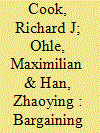|
|
|
Sort Order |
|
|
|
Items / Page
|
|
|
|
|
|
|
| Srl | Item |
| 1 |
ID:
177667


|
|
|
|
|
| Summary/Abstract |
Actors partially relinquish sovereignty in return for physical protection by a more powerful actor, generating a hierarchical relationship of a dominant, which supplies a political order, and subordinate(s), seeking the benefits that the political order can offer. This is the outcome of rationally assessing the respective situation, ultimately forgoing the presupposed paradigm that all actors are acknowledged as equal units in IR. The product of applying this hierarchical rubric to the Korean Peninsula offers a fundamental alternative for understanding how and why the current Korean Peninsula Nuclear Crisis unfolded in the manner that it did, while building upon relevant literature constituting the crux of hierarchy in international relations. What is presented are two political orders running parallel to one another: (1) the USA and the ROK and (2) China and the DPRK. Historically, both orders took fundamentally different tracks, as the USA and the ROK maintained a tight, valued and active social contract, while China and the DPRK periodically drifted into loose, devalued and inactive phases. Additionally, a paradigm has emerged following China’s inclusive behavior post-1978, the USA’s unipolar moment, and Washington’s aggressive signaling and actions, forcing the DPRK to reconsider its dominant’s reliability as a credible security guarantor. Having witnessed these seismic shifts, the DPRK has intensified its development of ‘the ultimate security guarantor’, leading to the contemporary crisis we are facing today.
|
|
|
|
|
|
|
|
|
|
|
|
|
|
|
|
| 2 |
ID:
183975


|
|
|
|
|
| Summary/Abstract |
Russia has enlisted the Russian Orthodox Church (ROC) and instrumentalised it as part of what can be described as a dynamic ‘soft-power offensive’. Its aim is to consolidate hierarchical power as a means to insulate an emerging Kremlin-centric political order and, subsequently, reassert its hegemonic influence over its periphery. This article argues that a strategy of using the Orthodox Church as a means of soft power is being deployed to bolster the realisation of this hegemony and, where possible, it aims to align potential subordinates’ interests with those of Moscow via the Christian Orthodox Church. More specifically, this article addresses the deployment of a Christian Orthodox Subordination Strategy (COSS) and its effects in Moldova and Ukraine.
|
|
|
|
|
|
|
|
|
|
|
|
|
|
|
|
|
|
|
|
|